Cognitive Psychology: Case Study, Essay, and Human Cognition Theories
VerifiedAdded on 2020/10/22
|14
|2651
|140
Report
AI Summary
This report delves into the realm of cognitive psychology, commencing with a case study response that examines key cognitive processes such as memory, attention, and language processing. It analyzes the strengths and limitations of these processes, referencing various cognitive theories like the multi-store model of memory and theories of forgetting. The report then transitions into a short essay that explores the applications of human cognition research, particularly in education and the diagnosis and treatment of memory disorders. It highlights how cognitive theories inform educational practices and aid in addressing learning difficulties and psychological conditions. The report emphasizes the significance of cognitive research for enhancing our understanding of human cognition and its implications across various domains.
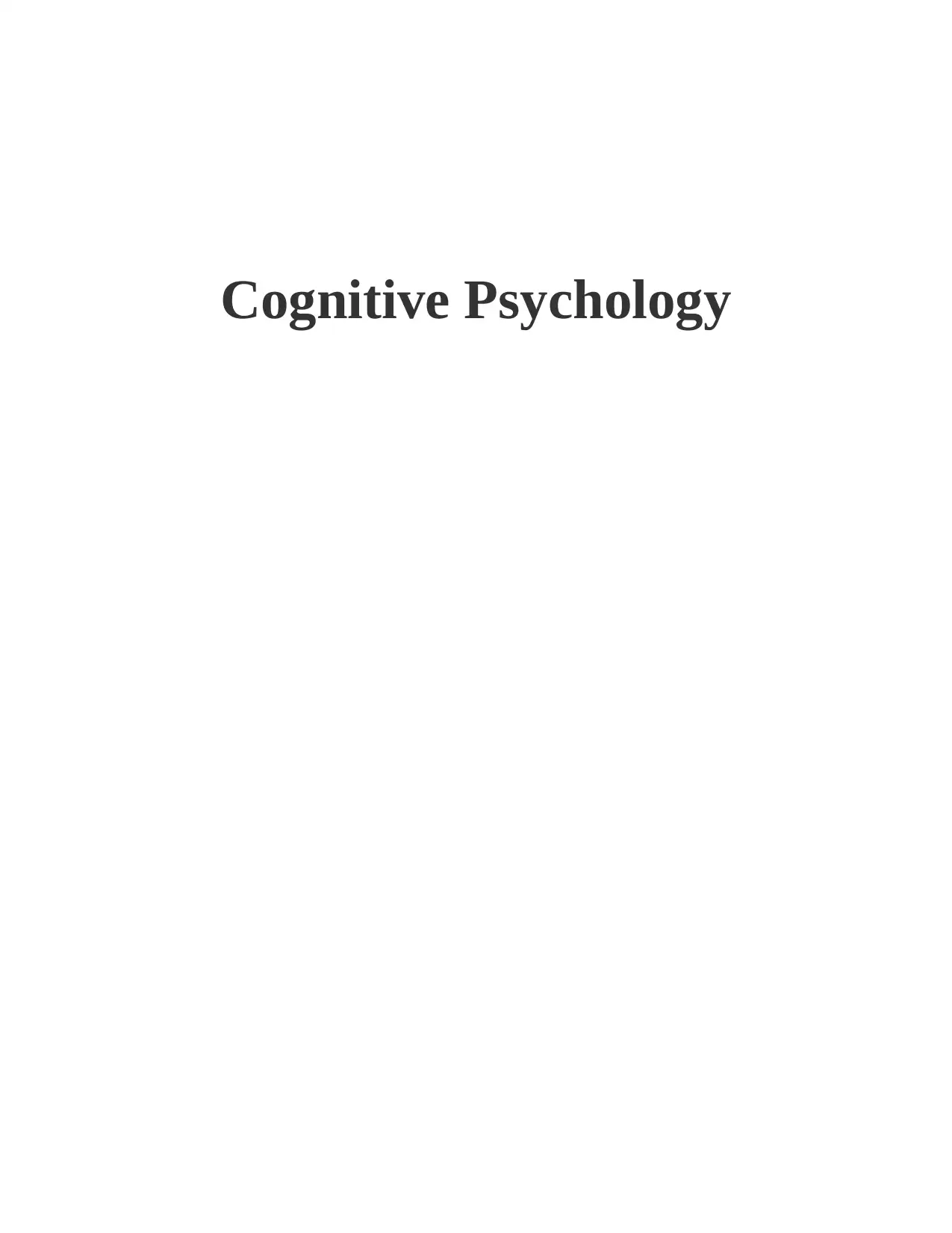
Cognitive Psychology
Paraphrase This Document
Need a fresh take? Get an instant paraphrase of this document with our AI Paraphraser
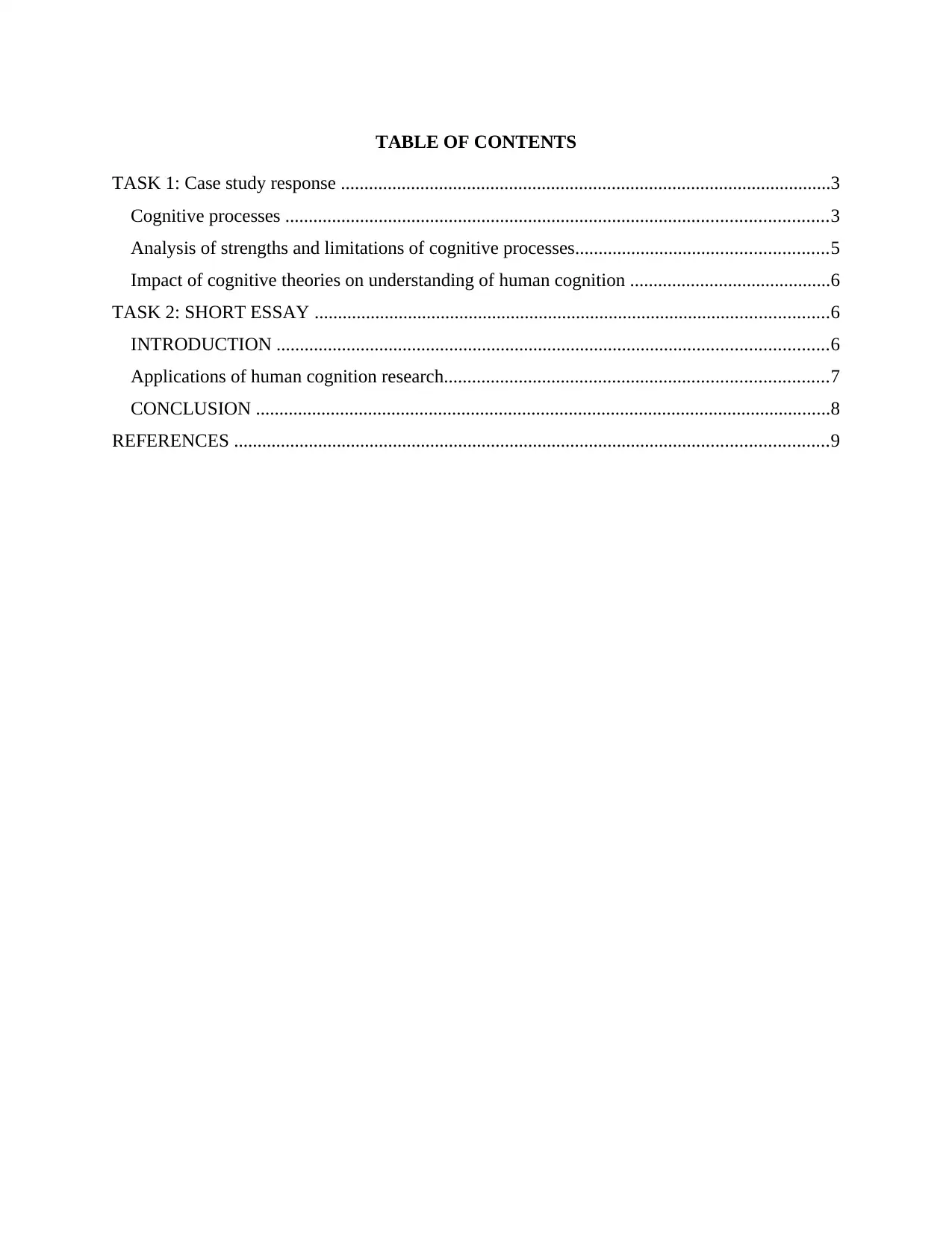
TABLE OF CONTENTS
TASK 1: Case study response .........................................................................................................3
Cognitive processes ....................................................................................................................3
Analysis of strengths and limitations of cognitive processes......................................................5
Impact of cognitive theories on understanding of human cognition ...........................................6
TASK 2: SHORT ESSAY ..............................................................................................................6
INTRODUCTION ......................................................................................................................6
Applications of human cognition research..................................................................................7
CONCLUSION ...........................................................................................................................8
REFERENCES ...............................................................................................................................9
TASK 1: Case study response .........................................................................................................3
Cognitive processes ....................................................................................................................3
Analysis of strengths and limitations of cognitive processes......................................................5
Impact of cognitive theories on understanding of human cognition ...........................................6
TASK 2: SHORT ESSAY ..............................................................................................................6
INTRODUCTION ......................................................................................................................6
Applications of human cognition research..................................................................................7
CONCLUSION ...........................................................................................................................8
REFERENCES ...............................................................................................................................9
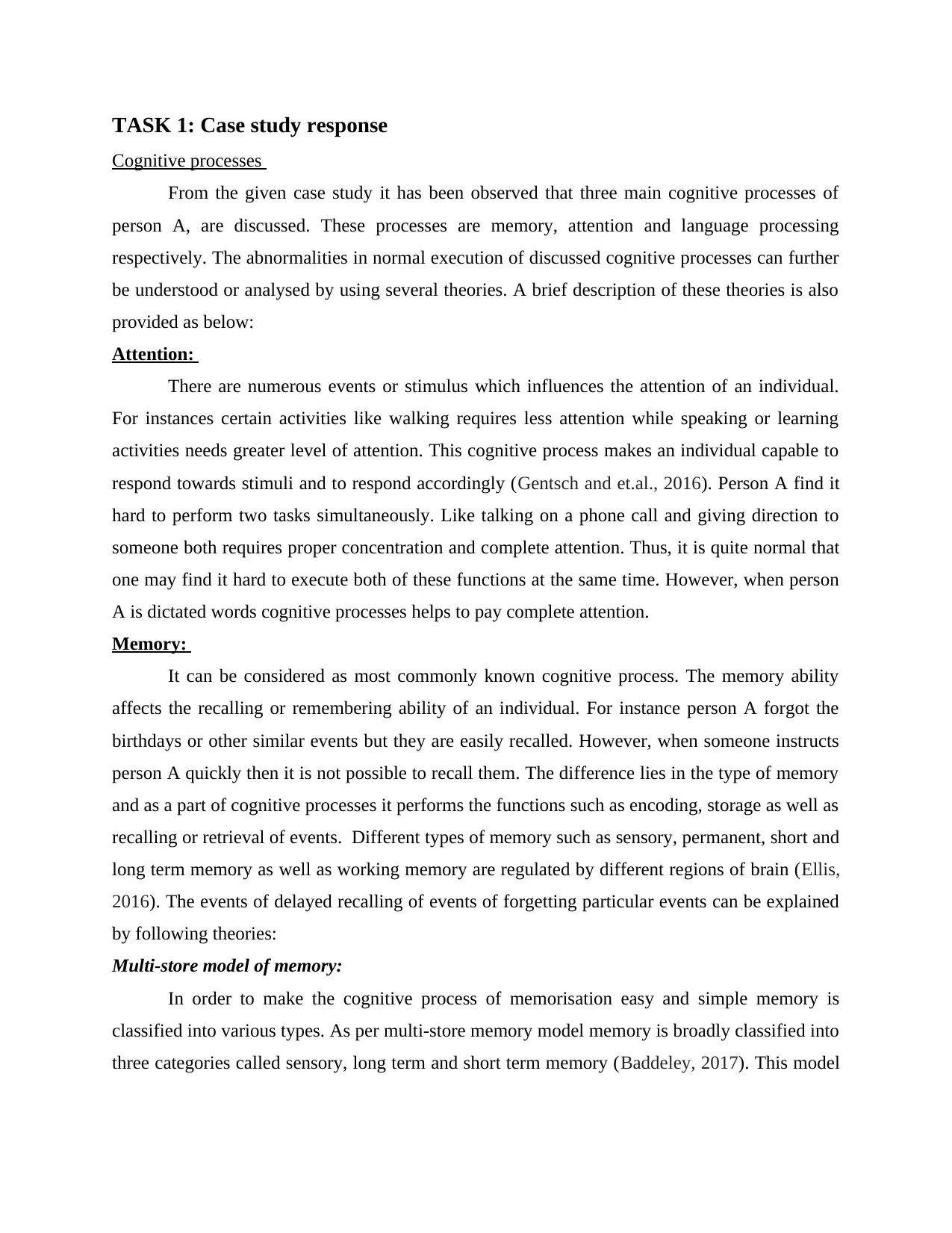
TASK 1: Case study response
Cognitive processes
From the given case study it has been observed that three main cognitive processes of
person A, are discussed. These processes are memory, attention and language processing
respectively. The abnormalities in normal execution of discussed cognitive processes can further
be understood or analysed by using several theories. A brief description of these theories is also
provided as below:
Attention:
There are numerous events or stimulus which influences the attention of an individual.
For instances certain activities like walking requires less attention while speaking or learning
activities needs greater level of attention. This cognitive process makes an individual capable to
respond towards stimuli and to respond accordingly (Gentsch and et.al., 2016). Person A find it
hard to perform two tasks simultaneously. Like talking on a phone call and giving direction to
someone both requires proper concentration and complete attention. Thus, it is quite normal that
one may find it hard to execute both of these functions at the same time. However, when person
A is dictated words cognitive processes helps to pay complete attention.
Memory:
It can be considered as most commonly known cognitive process. The memory ability
affects the recalling or remembering ability of an individual. For instance person A forgot the
birthdays or other similar events but they are easily recalled. However, when someone instructs
person A quickly then it is not possible to recall them. The difference lies in the type of memory
and as a part of cognitive processes it performs the functions such as encoding, storage as well as
recalling or retrieval of events. Different types of memory such as sensory, permanent, short and
long term memory as well as working memory are regulated by different regions of brain (Ellis,
2016). The events of delayed recalling of events of forgetting particular events can be explained
by following theories:
Multi-store model of memory:
In order to make the cognitive process of memorisation easy and simple memory is
classified into various types. As per multi-store memory model memory is broadly classified into
three categories called sensory, long term and short term memory (Baddeley, 2017). This model
Cognitive processes
From the given case study it has been observed that three main cognitive processes of
person A, are discussed. These processes are memory, attention and language processing
respectively. The abnormalities in normal execution of discussed cognitive processes can further
be understood or analysed by using several theories. A brief description of these theories is also
provided as below:
Attention:
There are numerous events or stimulus which influences the attention of an individual.
For instances certain activities like walking requires less attention while speaking or learning
activities needs greater level of attention. This cognitive process makes an individual capable to
respond towards stimuli and to respond accordingly (Gentsch and et.al., 2016). Person A find it
hard to perform two tasks simultaneously. Like talking on a phone call and giving direction to
someone both requires proper concentration and complete attention. Thus, it is quite normal that
one may find it hard to execute both of these functions at the same time. However, when person
A is dictated words cognitive processes helps to pay complete attention.
Memory:
It can be considered as most commonly known cognitive process. The memory ability
affects the recalling or remembering ability of an individual. For instance person A forgot the
birthdays or other similar events but they are easily recalled. However, when someone instructs
person A quickly then it is not possible to recall them. The difference lies in the type of memory
and as a part of cognitive processes it performs the functions such as encoding, storage as well as
recalling or retrieval of events. Different types of memory such as sensory, permanent, short and
long term memory as well as working memory are regulated by different regions of brain (Ellis,
2016). The events of delayed recalling of events of forgetting particular events can be explained
by following theories:
Multi-store model of memory:
In order to make the cognitive process of memorisation easy and simple memory is
classified into various types. As per multi-store memory model memory is broadly classified into
three categories called sensory, long term and short term memory (Baddeley, 2017). This model
⊘ This is a preview!⊘
Do you want full access?
Subscribe today to unlock all pages.

Trusted by 1+ million students worldwide
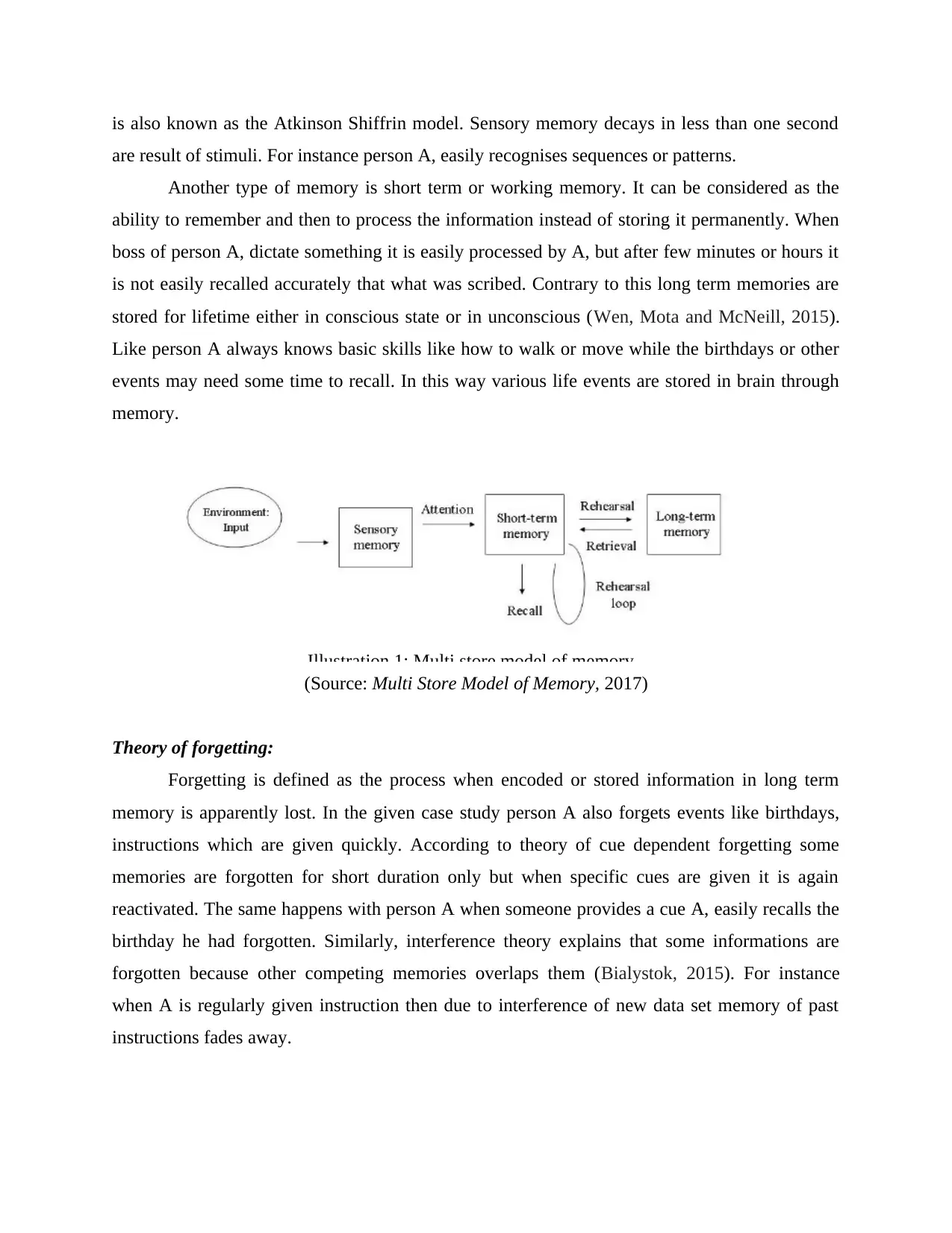
is also known as the Atkinson Shiffrin model. Sensory memory decays in less than one second
are result of stimuli. For instance person A, easily recognises sequences or patterns.
Another type of memory is short term or working memory. It can be considered as the
ability to remember and then to process the information instead of storing it permanently. When
boss of person A, dictate something it is easily processed by A, but after few minutes or hours it
is not easily recalled accurately that what was scribed. Contrary to this long term memories are
stored for lifetime either in conscious state or in unconscious (Wen, Mota and McNeill, 2015).
Like person A always knows basic skills like how to walk or move while the birthdays or other
events may need some time to recall. In this way various life events are stored in brain through
memory.
(Source: Multi Store Model of Memory, 2017)
Theory of forgetting:
Forgetting is defined as the process when encoded or stored information in long term
memory is apparently lost. In the given case study person A also forgets events like birthdays,
instructions which are given quickly. According to theory of cue dependent forgetting some
memories are forgotten for short duration only but when specific cues are given it is again
reactivated. The same happens with person A when someone provides a cue A, easily recalls the
birthday he had forgotten. Similarly, interference theory explains that some informations are
forgotten because other competing memories overlaps them (Bialystok, 2015). For instance
when A is regularly given instruction then due to interference of new data set memory of past
instructions fades away.
Illustration 1: Multi store model of memory
are result of stimuli. For instance person A, easily recognises sequences or patterns.
Another type of memory is short term or working memory. It can be considered as the
ability to remember and then to process the information instead of storing it permanently. When
boss of person A, dictate something it is easily processed by A, but after few minutes or hours it
is not easily recalled accurately that what was scribed. Contrary to this long term memories are
stored for lifetime either in conscious state or in unconscious (Wen, Mota and McNeill, 2015).
Like person A always knows basic skills like how to walk or move while the birthdays or other
events may need some time to recall. In this way various life events are stored in brain through
memory.
(Source: Multi Store Model of Memory, 2017)
Theory of forgetting:
Forgetting is defined as the process when encoded or stored information in long term
memory is apparently lost. In the given case study person A also forgets events like birthdays,
instructions which are given quickly. According to theory of cue dependent forgetting some
memories are forgotten for short duration only but when specific cues are given it is again
reactivated. The same happens with person A when someone provides a cue A, easily recalls the
birthday he had forgotten. Similarly, interference theory explains that some informations are
forgotten because other competing memories overlaps them (Bialystok, 2015). For instance
when A is regularly given instruction then due to interference of new data set memory of past
instructions fades away.
Illustration 1: Multi store model of memory
Paraphrase This Document
Need a fresh take? Get an instant paraphrase of this document with our AI Paraphraser
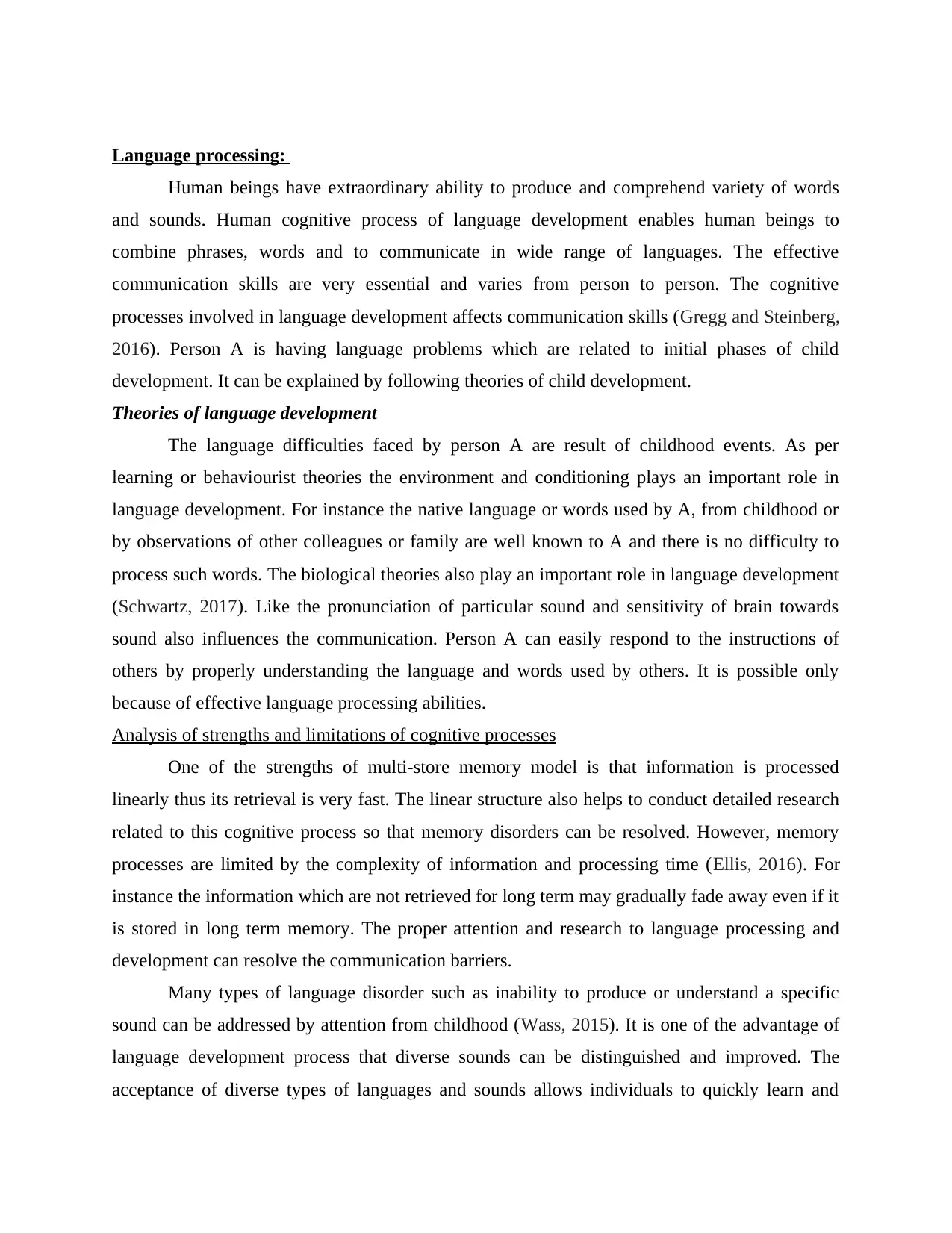
Language processing:
Human beings have extraordinary ability to produce and comprehend variety of words
and sounds. Human cognitive process of language development enables human beings to
combine phrases, words and to communicate in wide range of languages. The effective
communication skills are very essential and varies from person to person. The cognitive
processes involved in language development affects communication skills (Gregg and Steinberg,
2016). Person A is having language problems which are related to initial phases of child
development. It can be explained by following theories of child development.
Theories of language development
The language difficulties faced by person A are result of childhood events. As per
learning or behaviourist theories the environment and conditioning plays an important role in
language development. For instance the native language or words used by A, from childhood or
by observations of other colleagues or family are well known to A and there is no difficulty to
process such words. The biological theories also play an important role in language development
(Schwartz, 2017). Like the pronunciation of particular sound and sensitivity of brain towards
sound also influences the communication. Person A can easily respond to the instructions of
others by properly understanding the language and words used by others. It is possible only
because of effective language processing abilities.
Analysis of strengths and limitations of cognitive processes
One of the strengths of multi-store memory model is that information is processed
linearly thus its retrieval is very fast. The linear structure also helps to conduct detailed research
related to this cognitive process so that memory disorders can be resolved. However, memory
processes are limited by the complexity of information and processing time (Ellis, 2016). For
instance the information which are not retrieved for long term may gradually fade away even if it
is stored in long term memory. The proper attention and research to language processing and
development can resolve the communication barriers.
Many types of language disorder such as inability to produce or understand a specific
sound can be addressed by attention from childhood (Wass, 2015). It is one of the advantage of
language development process that diverse sounds can be distinguished and improved. The
acceptance of diverse types of languages and sounds allows individuals to quickly learn and
Human beings have extraordinary ability to produce and comprehend variety of words
and sounds. Human cognitive process of language development enables human beings to
combine phrases, words and to communicate in wide range of languages. The effective
communication skills are very essential and varies from person to person. The cognitive
processes involved in language development affects communication skills (Gregg and Steinberg,
2016). Person A is having language problems which are related to initial phases of child
development. It can be explained by following theories of child development.
Theories of language development
The language difficulties faced by person A are result of childhood events. As per
learning or behaviourist theories the environment and conditioning plays an important role in
language development. For instance the native language or words used by A, from childhood or
by observations of other colleagues or family are well known to A and there is no difficulty to
process such words. The biological theories also play an important role in language development
(Schwartz, 2017). Like the pronunciation of particular sound and sensitivity of brain towards
sound also influences the communication. Person A can easily respond to the instructions of
others by properly understanding the language and words used by others. It is possible only
because of effective language processing abilities.
Analysis of strengths and limitations of cognitive processes
One of the strengths of multi-store memory model is that information is processed
linearly thus its retrieval is very fast. The linear structure also helps to conduct detailed research
related to this cognitive process so that memory disorders can be resolved. However, memory
processes are limited by the complexity of information and processing time (Ellis, 2016). For
instance the information which are not retrieved for long term may gradually fade away even if it
is stored in long term memory. The proper attention and research to language processing and
development can resolve the communication barriers.
Many types of language disorder such as inability to produce or understand a specific
sound can be addressed by attention from childhood (Wass, 2015). It is one of the advantage of
language development process that diverse sounds can be distinguished and improved. The
acceptance of diverse types of languages and sounds allows individuals to quickly learn and
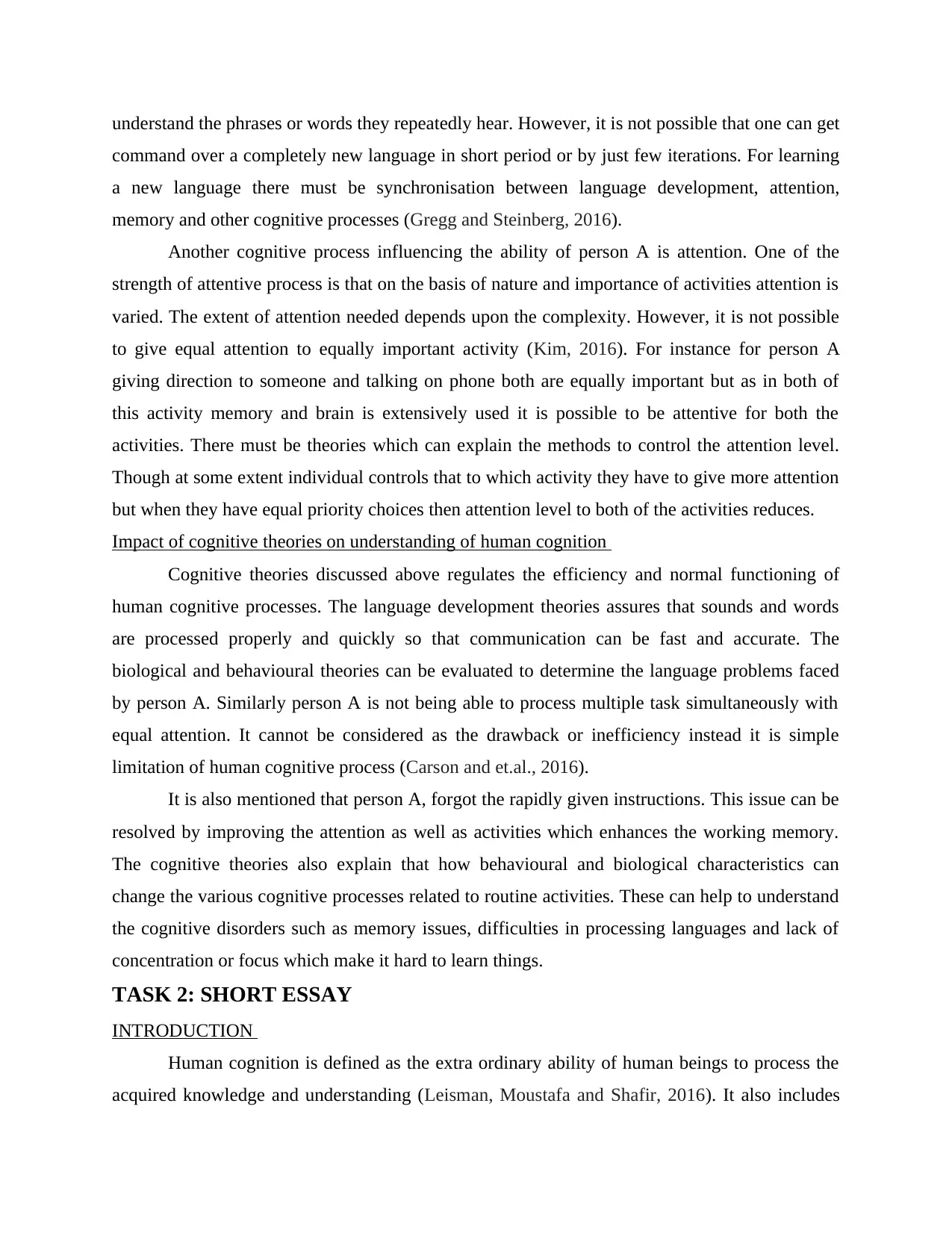
understand the phrases or words they repeatedly hear. However, it is not possible that one can get
command over a completely new language in short period or by just few iterations. For learning
a new language there must be synchronisation between language development, attention,
memory and other cognitive processes (Gregg and Steinberg, 2016).
Another cognitive process influencing the ability of person A is attention. One of the
strength of attentive process is that on the basis of nature and importance of activities attention is
varied. The extent of attention needed depends upon the complexity. However, it is not possible
to give equal attention to equally important activity (Kim, 2016). For instance for person A
giving direction to someone and talking on phone both are equally important but as in both of
this activity memory and brain is extensively used it is possible to be attentive for both the
activities. There must be theories which can explain the methods to control the attention level.
Though at some extent individual controls that to which activity they have to give more attention
but when they have equal priority choices then attention level to both of the activities reduces.
Impact of cognitive theories on understanding of human cognition
Cognitive theories discussed above regulates the efficiency and normal functioning of
human cognitive processes. The language development theories assures that sounds and words
are processed properly and quickly so that communication can be fast and accurate. The
biological and behavioural theories can be evaluated to determine the language problems faced
by person A. Similarly person A is not being able to process multiple task simultaneously with
equal attention. It cannot be considered as the drawback or inefficiency instead it is simple
limitation of human cognitive process (Carson and et.al., 2016).
It is also mentioned that person A, forgot the rapidly given instructions. This issue can be
resolved by improving the attention as well as activities which enhances the working memory.
The cognitive theories also explain that how behavioural and biological characteristics can
change the various cognitive processes related to routine activities. These can help to understand
the cognitive disorders such as memory issues, difficulties in processing languages and lack of
concentration or focus which make it hard to learn things.
TASK 2: SHORT ESSAY
INTRODUCTION
Human cognition is defined as the extra ordinary ability of human beings to process the
acquired knowledge and understanding (Leisman, Moustafa and Shafir, 2016). It also includes
command over a completely new language in short period or by just few iterations. For learning
a new language there must be synchronisation between language development, attention,
memory and other cognitive processes (Gregg and Steinberg, 2016).
Another cognitive process influencing the ability of person A is attention. One of the
strength of attentive process is that on the basis of nature and importance of activities attention is
varied. The extent of attention needed depends upon the complexity. However, it is not possible
to give equal attention to equally important activity (Kim, 2016). For instance for person A
giving direction to someone and talking on phone both are equally important but as in both of
this activity memory and brain is extensively used it is possible to be attentive for both the
activities. There must be theories which can explain the methods to control the attention level.
Though at some extent individual controls that to which activity they have to give more attention
but when they have equal priority choices then attention level to both of the activities reduces.
Impact of cognitive theories on understanding of human cognition
Cognitive theories discussed above regulates the efficiency and normal functioning of
human cognitive processes. The language development theories assures that sounds and words
are processed properly and quickly so that communication can be fast and accurate. The
biological and behavioural theories can be evaluated to determine the language problems faced
by person A. Similarly person A is not being able to process multiple task simultaneously with
equal attention. It cannot be considered as the drawback or inefficiency instead it is simple
limitation of human cognitive process (Carson and et.al., 2016).
It is also mentioned that person A, forgot the rapidly given instructions. This issue can be
resolved by improving the attention as well as activities which enhances the working memory.
The cognitive theories also explain that how behavioural and biological characteristics can
change the various cognitive processes related to routine activities. These can help to understand
the cognitive disorders such as memory issues, difficulties in processing languages and lack of
concentration or focus which make it hard to learn things.
TASK 2: SHORT ESSAY
INTRODUCTION
Human cognition is defined as the extra ordinary ability of human beings to process the
acquired knowledge and understanding (Leisman, Moustafa and Shafir, 2016). It also includes
⊘ This is a preview!⊘
Do you want full access?
Subscribe today to unlock all pages.

Trusted by 1+ million students worldwide
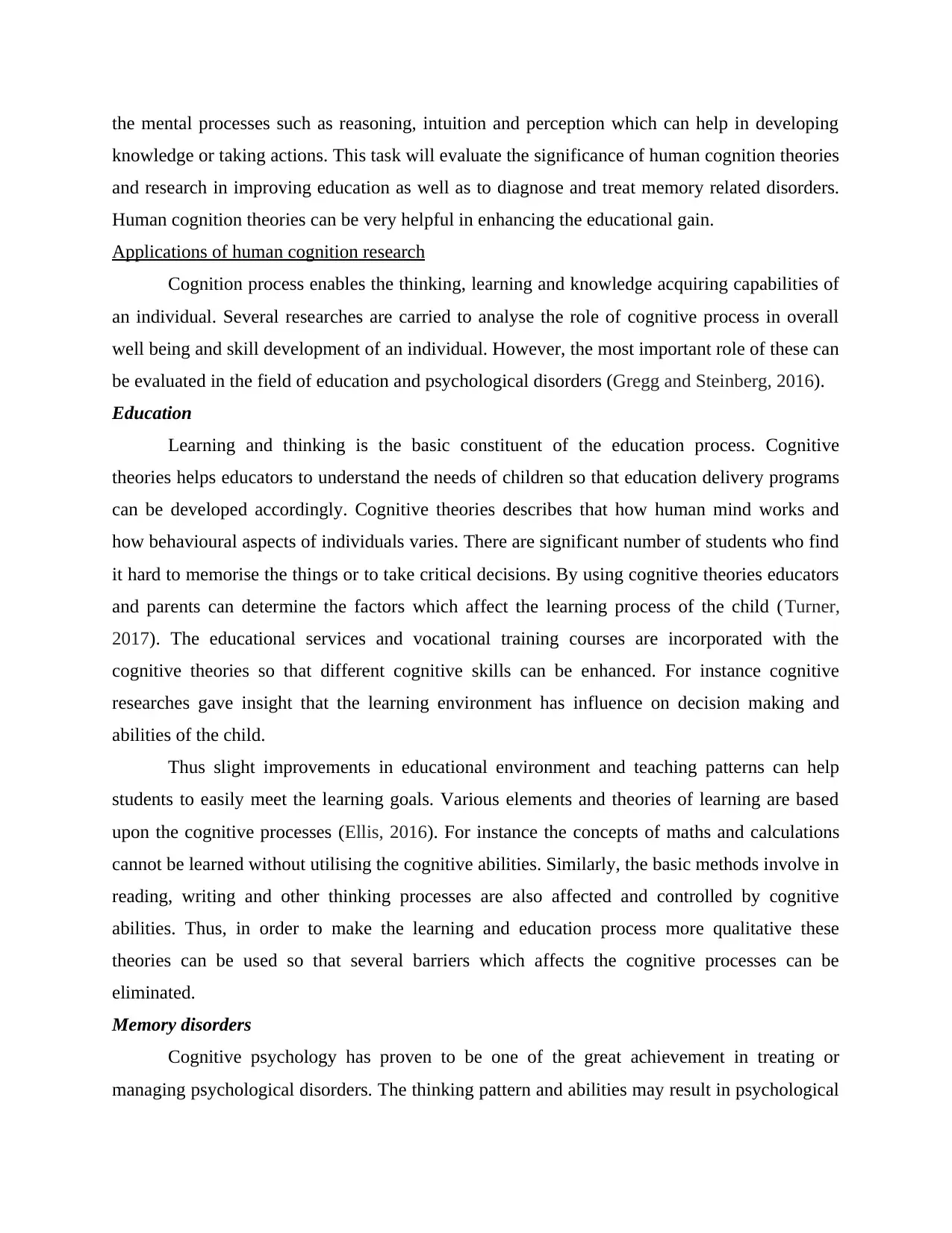
the mental processes such as reasoning, intuition and perception which can help in developing
knowledge or taking actions. This task will evaluate the significance of human cognition theories
and research in improving education as well as to diagnose and treat memory related disorders.
Human cognition theories can be very helpful in enhancing the educational gain.
Applications of human cognition research
Cognition process enables the thinking, learning and knowledge acquiring capabilities of
an individual. Several researches are carried to analyse the role of cognitive process in overall
well being and skill development of an individual. However, the most important role of these can
be evaluated in the field of education and psychological disorders (Gregg and Steinberg, 2016).
Education
Learning and thinking is the basic constituent of the education process. Cognitive
theories helps educators to understand the needs of children so that education delivery programs
can be developed accordingly. Cognitive theories describes that how human mind works and
how behavioural aspects of individuals varies. There are significant number of students who find
it hard to memorise the things or to take critical decisions. By using cognitive theories educators
and parents can determine the factors which affect the learning process of the child (Turner,
2017). The educational services and vocational training courses are incorporated with the
cognitive theories so that different cognitive skills can be enhanced. For instance cognitive
researches gave insight that the learning environment has influence on decision making and
abilities of the child.
Thus slight improvements in educational environment and teaching patterns can help
students to easily meet the learning goals. Various elements and theories of learning are based
upon the cognitive processes (Ellis, 2016). For instance the concepts of maths and calculations
cannot be learned without utilising the cognitive abilities. Similarly, the basic methods involve in
reading, writing and other thinking processes are also affected and controlled by cognitive
abilities. Thus, in order to make the learning and education process more qualitative these
theories can be used so that several barriers which affects the cognitive processes can be
eliminated.
Memory disorders
Cognitive psychology has proven to be one of the great achievement in treating or
managing psychological disorders. The thinking pattern and abilities may result in psychological
knowledge or taking actions. This task will evaluate the significance of human cognition theories
and research in improving education as well as to diagnose and treat memory related disorders.
Human cognition theories can be very helpful in enhancing the educational gain.
Applications of human cognition research
Cognition process enables the thinking, learning and knowledge acquiring capabilities of
an individual. Several researches are carried to analyse the role of cognitive process in overall
well being and skill development of an individual. However, the most important role of these can
be evaluated in the field of education and psychological disorders (Gregg and Steinberg, 2016).
Education
Learning and thinking is the basic constituent of the education process. Cognitive
theories helps educators to understand the needs of children so that education delivery programs
can be developed accordingly. Cognitive theories describes that how human mind works and
how behavioural aspects of individuals varies. There are significant number of students who find
it hard to memorise the things or to take critical decisions. By using cognitive theories educators
and parents can determine the factors which affect the learning process of the child (Turner,
2017). The educational services and vocational training courses are incorporated with the
cognitive theories so that different cognitive skills can be enhanced. For instance cognitive
researches gave insight that the learning environment has influence on decision making and
abilities of the child.
Thus slight improvements in educational environment and teaching patterns can help
students to easily meet the learning goals. Various elements and theories of learning are based
upon the cognitive processes (Ellis, 2016). For instance the concepts of maths and calculations
cannot be learned without utilising the cognitive abilities. Similarly, the basic methods involve in
reading, writing and other thinking processes are also affected and controlled by cognitive
abilities. Thus, in order to make the learning and education process more qualitative these
theories can be used so that several barriers which affects the cognitive processes can be
eliminated.
Memory disorders
Cognitive psychology has proven to be one of the great achievement in treating or
managing psychological disorders. The thinking pattern and abilities may result in psychological
Paraphrase This Document
Need a fresh take? Get an instant paraphrase of this document with our AI Paraphraser
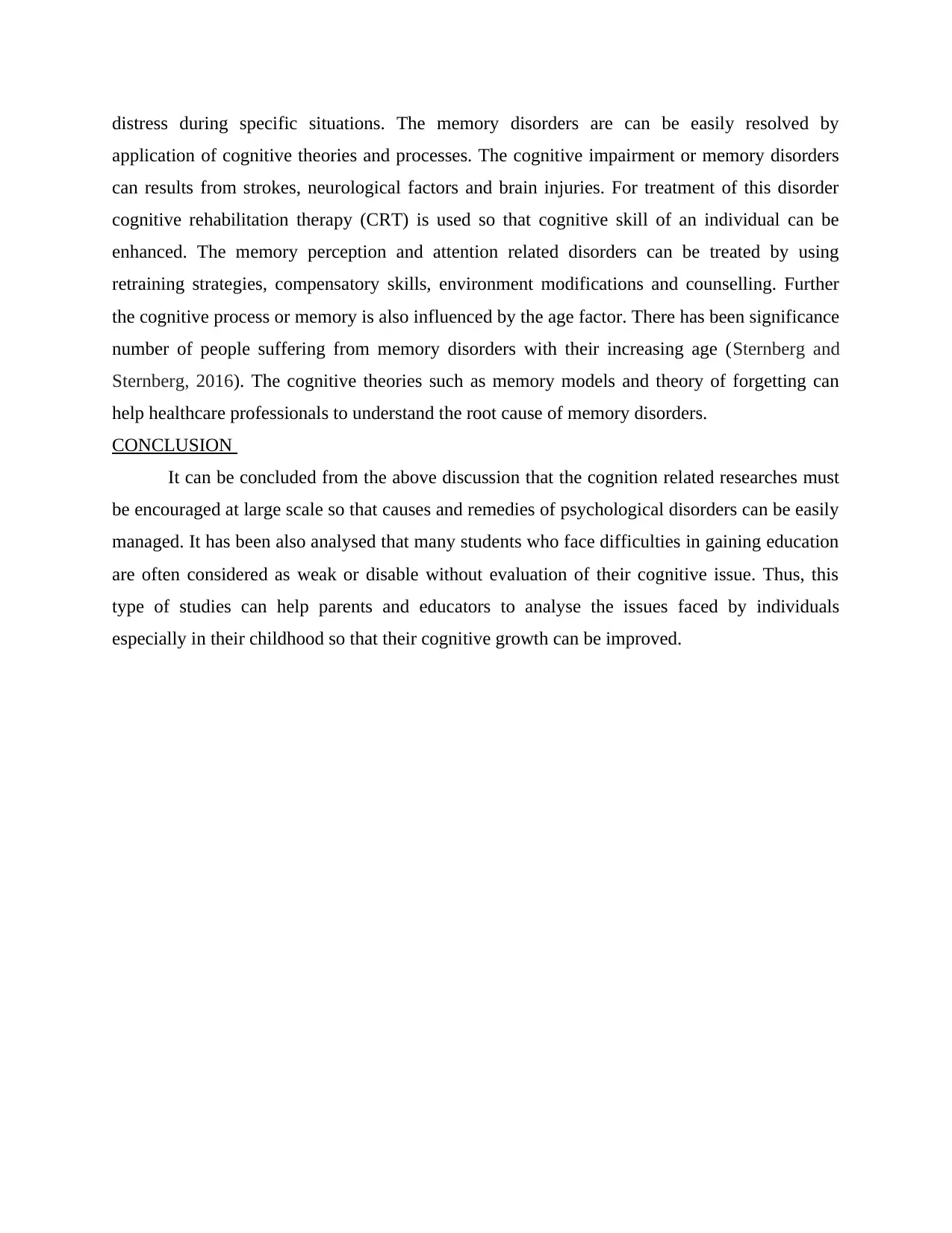
distress during specific situations. The memory disorders are can be easily resolved by
application of cognitive theories and processes. The cognitive impairment or memory disorders
can results from strokes, neurological factors and brain injuries. For treatment of this disorder
cognitive rehabilitation therapy (CRT) is used so that cognitive skill of an individual can be
enhanced. The memory perception and attention related disorders can be treated by using
retraining strategies, compensatory skills, environment modifications and counselling. Further
the cognitive process or memory is also influenced by the age factor. There has been significance
number of people suffering from memory disorders with their increasing age (Sternberg and
Sternberg, 2016). The cognitive theories such as memory models and theory of forgetting can
help healthcare professionals to understand the root cause of memory disorders.
CONCLUSION
It can be concluded from the above discussion that the cognition related researches must
be encouraged at large scale so that causes and remedies of psychological disorders can be easily
managed. It has been also analysed that many students who face difficulties in gaining education
are often considered as weak or disable without evaluation of their cognitive issue. Thus, this
type of studies can help parents and educators to analyse the issues faced by individuals
especially in their childhood so that their cognitive growth can be improved.
application of cognitive theories and processes. The cognitive impairment or memory disorders
can results from strokes, neurological factors and brain injuries. For treatment of this disorder
cognitive rehabilitation therapy (CRT) is used so that cognitive skill of an individual can be
enhanced. The memory perception and attention related disorders can be treated by using
retraining strategies, compensatory skills, environment modifications and counselling. Further
the cognitive process or memory is also influenced by the age factor. There has been significance
number of people suffering from memory disorders with their increasing age (Sternberg and
Sternberg, 2016). The cognitive theories such as memory models and theory of forgetting can
help healthcare professionals to understand the root cause of memory disorders.
CONCLUSION
It can be concluded from the above discussion that the cognition related researches must
be encouraged at large scale so that causes and remedies of psychological disorders can be easily
managed. It has been also analysed that many students who face difficulties in gaining education
are often considered as weak or disable without evaluation of their cognitive issue. Thus, this
type of studies can help parents and educators to analyse the issues faced by individuals
especially in their childhood so that their cognitive growth can be improved.
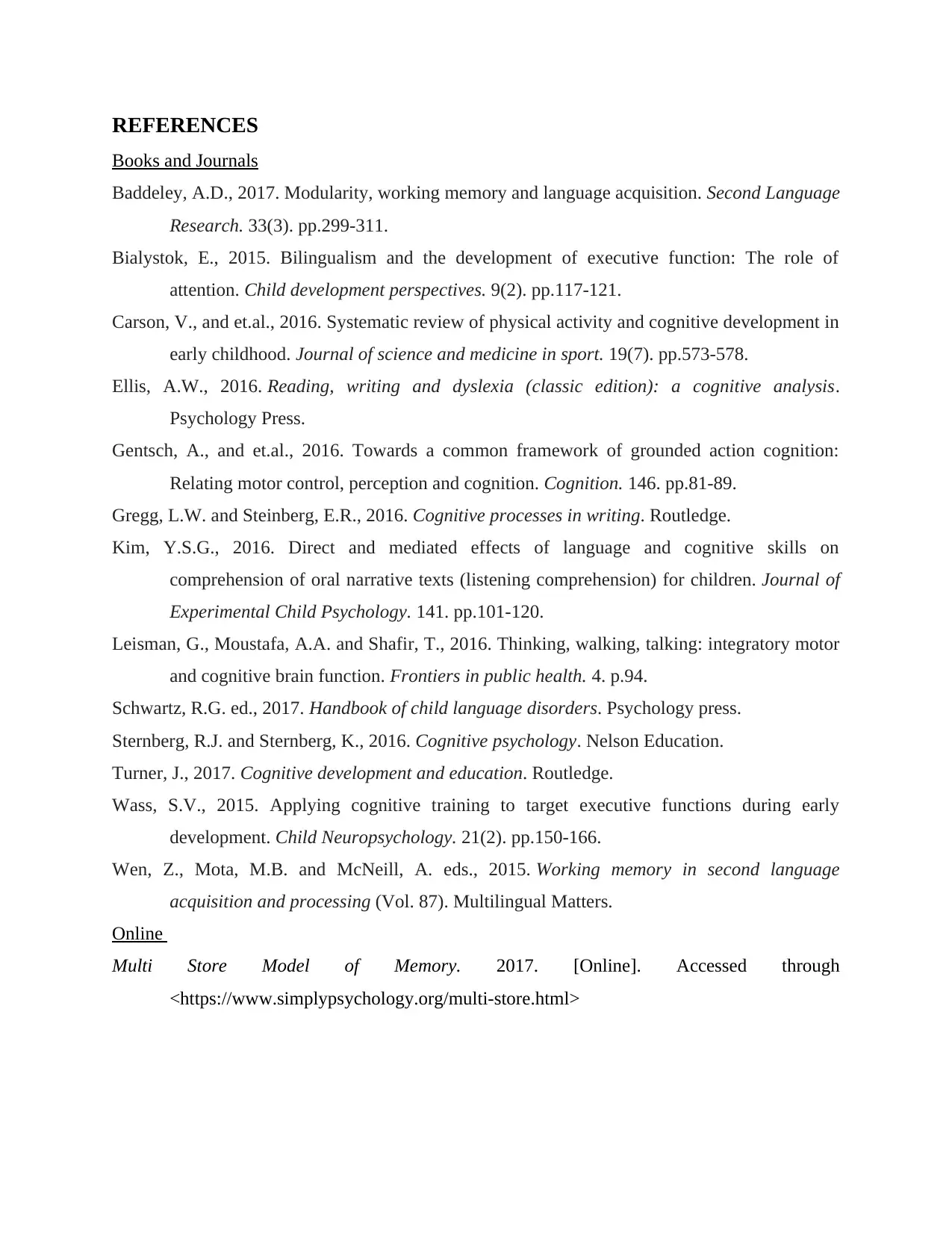
REFERENCES
Books and Journals
Baddeley, A.D., 2017. Modularity, working memory and language acquisition. Second Language
Research. 33(3). pp.299-311.
Bialystok, E., 2015. Bilingualism and the development of executive function: The role of
attention. Child development perspectives. 9(2). pp.117-121.
Carson, V., and et.al., 2016. Systematic review of physical activity and cognitive development in
early childhood. Journal of science and medicine in sport. 19(7). pp.573-578.
Ellis, A.W., 2016. Reading, writing and dyslexia (classic edition): a cognitive analysis.
Psychology Press.
Gentsch, A., and et.al., 2016. Towards a common framework of grounded action cognition:
Relating motor control, perception and cognition. Cognition. 146. pp.81-89.
Gregg, L.W. and Steinberg, E.R., 2016. Cognitive processes in writing. Routledge.
Kim, Y.S.G., 2016. Direct and mediated effects of language and cognitive skills on
comprehension of oral narrative texts (listening comprehension) for children. Journal of
Experimental Child Psychology. 141. pp.101-120.
Leisman, G., Moustafa, A.A. and Shafir, T., 2016. Thinking, walking, talking: integratory motor
and cognitive brain function. Frontiers in public health. 4. p.94.
Schwartz, R.G. ed., 2017. Handbook of child language disorders. Psychology press.
Sternberg, R.J. and Sternberg, K., 2016. Cognitive psychology. Nelson Education.
Turner, J., 2017. Cognitive development and education. Routledge.
Wass, S.V., 2015. Applying cognitive training to target executive functions during early
development. Child Neuropsychology. 21(2). pp.150-166.
Wen, Z., Mota, M.B. and McNeill, A. eds., 2015. Working memory in second language
acquisition and processing (Vol. 87). Multilingual Matters.
Online
Multi Store Model of Memory. 2017. [Online]. Accessed through
<https://www.simplypsychology.org/multi-store.html>
Books and Journals
Baddeley, A.D., 2017. Modularity, working memory and language acquisition. Second Language
Research. 33(3). pp.299-311.
Bialystok, E., 2015. Bilingualism and the development of executive function: The role of
attention. Child development perspectives. 9(2). pp.117-121.
Carson, V., and et.al., 2016. Systematic review of physical activity and cognitive development in
early childhood. Journal of science and medicine in sport. 19(7). pp.573-578.
Ellis, A.W., 2016. Reading, writing and dyslexia (classic edition): a cognitive analysis.
Psychology Press.
Gentsch, A., and et.al., 2016. Towards a common framework of grounded action cognition:
Relating motor control, perception and cognition. Cognition. 146. pp.81-89.
Gregg, L.W. and Steinberg, E.R., 2016. Cognitive processes in writing. Routledge.
Kim, Y.S.G., 2016. Direct and mediated effects of language and cognitive skills on
comprehension of oral narrative texts (listening comprehension) for children. Journal of
Experimental Child Psychology. 141. pp.101-120.
Leisman, G., Moustafa, A.A. and Shafir, T., 2016. Thinking, walking, talking: integratory motor
and cognitive brain function. Frontiers in public health. 4. p.94.
Schwartz, R.G. ed., 2017. Handbook of child language disorders. Psychology press.
Sternberg, R.J. and Sternberg, K., 2016. Cognitive psychology. Nelson Education.
Turner, J., 2017. Cognitive development and education. Routledge.
Wass, S.V., 2015. Applying cognitive training to target executive functions during early
development. Child Neuropsychology. 21(2). pp.150-166.
Wen, Z., Mota, M.B. and McNeill, A. eds., 2015. Working memory in second language
acquisition and processing (Vol. 87). Multilingual Matters.
Online
Multi Store Model of Memory. 2017. [Online]. Accessed through
<https://www.simplypsychology.org/multi-store.html>
⊘ This is a preview!⊘
Do you want full access?
Subscribe today to unlock all pages.

Trusted by 1+ million students worldwide

Paraphrase This Document
Need a fresh take? Get an instant paraphrase of this document with our AI Paraphraser


⊘ This is a preview!⊘
Do you want full access?
Subscribe today to unlock all pages.

Trusted by 1+ million students worldwide
1 out of 14
Related Documents
Your All-in-One AI-Powered Toolkit for Academic Success.
+13062052269
info@desklib.com
Available 24*7 on WhatsApp / Email
![[object Object]](/_next/static/media/star-bottom.7253800d.svg)
Unlock your academic potential
Copyright © 2020–2026 A2Z Services. All Rights Reserved. Developed and managed by ZUCOL.




